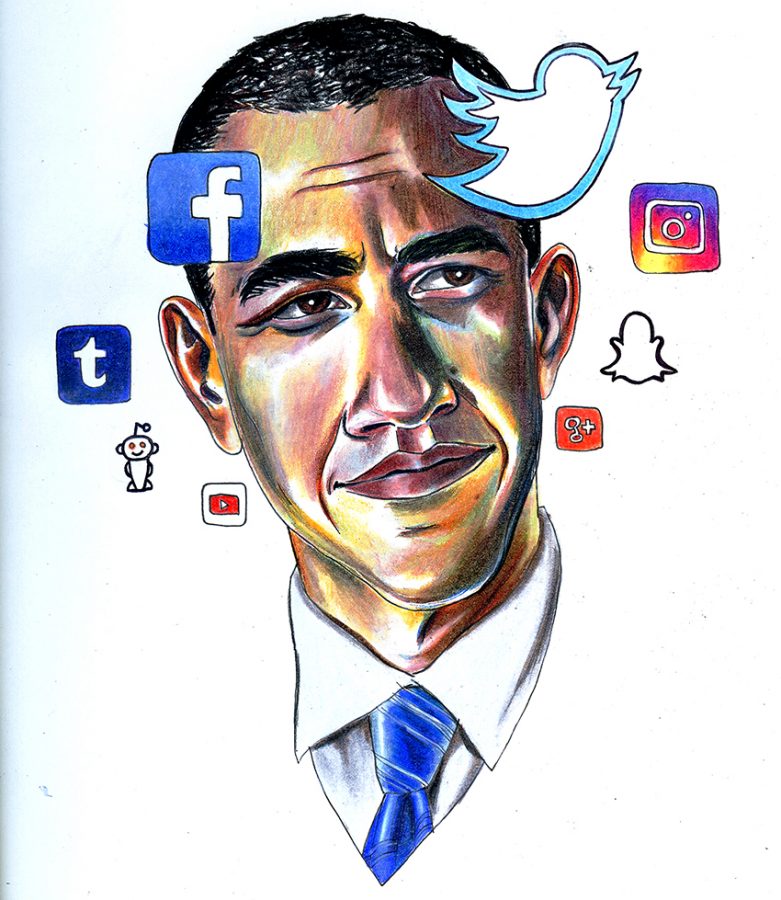Last October, the White House asked the public what they would do with all of former President Barack Obama’s social media posts at their fingertips. Amelia Acker, UT School of Information assistant professor, has a few ideas.
“We’re using the collection right now to study the metadata,” Acker said. “Metadata is information about information — the way metadata structures social media influences the way librarians or archivists preserve it and provide access to it in the future.”
Throughout Obama’s eight years in office, the White House issued millions of tweets, snaps and other media posts in an effort to communicate with citizens that dwarfs FDR’s original fireside chats.
Acker plans to use the social media data to teach a master’s course on metadata applications. She will also work with Adam Kriesberg, a postdoctoral scholar at the University of Maryland iSchool, to research digital preservation and promote future archival access of social media.
“We saw this as an opportunity to explore how the president engaged and how that engagement differed across platforms,” Kriesberg said. “We also saw it as an opportunity to look at how the metadata and material looks when you pull it out of the platform and how to preserve it outside of its home.”
The potential in researching social media has greatly increased as its usage has become an integral part of politics, Kriesberg said. The Presidential Records Act, which states that any record created by a president needs to be turned over to the National Archive and Records Administration, was expanded in 2010 to include tweets. According to Acker, the data received from the White House is desirable for research.
“The Obama White House was very formal with the way they communicate with online platforms,” Acker said. “When the information is clean and formal, researchers can dig into the metadata.”
Acker said the public portal will aid in researching metadata across several platforms.
“Right now, social media metadata is not standardized, and that has a significant impact on … future access implications,” Acker said. “That’s why it’s such a gift to have an archive on social media across so many platforms. It’s very rare to have access to all (these) social media platforms, like Twitter and Instagram.”
The ArchiveSocial portal allows the public to access content from more than 100 accounts spanning eight platforms. Citizens, universities and organizations answered the White House’s call to action with ideas for innovative archival projects, including Acker’s work, a GIPHY search engine dedicated to consolidating White House GIFs and Vines and ArchiveSocial, a searchable social media archiving platform.
“The White House social media archive tells the story not just of how we’ve used these platforms to engage with people wherever they are, but also of how the digital landscape has changed over the past eight years,” Joshua Miller, the White House director of product management, said in a blog post.
According to iSchool Dean Andrew Dillon, Acker’s research and teaching project emphasize the importance of preserving access to the records of the first U.S. president to extensively adopt social media.
“We need to cross disciplinary boundaries to understand how new media are impacting all human endeavors, and the iSchool is committed to advancing the scholarship on information through research and teaching of user experience design, digital records management and human behavior in digital space,” Dillon said.
This semester, Acker is using this dataset to teach her masters students, most of whom are aspiring librarians or archivists.
“(Metadata) connects you in this long chain of past people and future people providing access to information,” Acker said. “It’s very exciting to me to think about this information and ensuring its preservation in the future, whether it be 10 years or 20 years or 200 years.”















